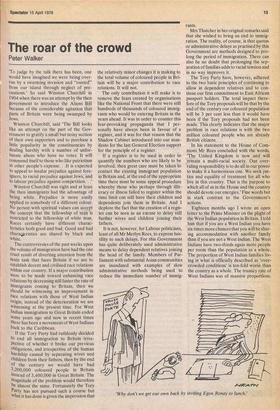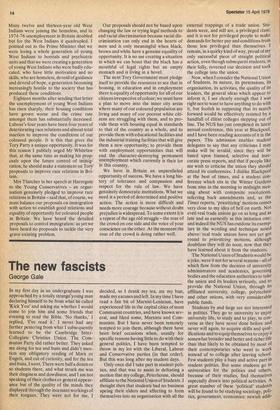The roar of the crowd
Peter Walker
'To judge by the talk there has been, one Would have imagined we were being overrun by a swarming invasion and "ousted" from our island through neglect of precautions.' So said Winston Churchill in 1904 when there was an attempt by the then government to introduce the Aliens Bill because of the considerable agitation that Parts of Britain were being swamped by Jews.
Winston Churchill, said 'The Bill looks like an attempt on the part of the Government to gratify a small but noisy section of their own supporters and to purchase a little popularity in the constituencies by dealing harshly with a number. of unfortunate aliens who have no votes. It will commend itself to those who like patriotism at other people's expense. . .It is expected to appeal to insular prejudice against foreigners, to racial prejudice against Jews, and to labour prejudice against competition...'
Winston Churchill was right and at least the then immigrants had the advantage of being white. Prejudice is more easily applied to somebody of a different colour. No person with spiritual values can accept the concept that the fellowship of man is restricted to the fellowship of white man. Races certainly have different characteristics both good and bad. Good and bad charagteristics are shared by black and White.
The controversies of the past weeks upon the volume of immigration have had the one cruel result of diverting attention from the main task that faces Britain if we are to establish decent and civilised race relations Within our country. If a major contribution Were to be made toward enhancing race relations by decreasing still faster the rate of immigrants coming to Britain, then we Should be witnessing an improvement in race relations with those of West Indian origin, instead of the deterioration we are witnessing at the present time. For West Indian immigration to Great Britain ended some years ago and now in recent times there has been a movement of West Indians back to the Caribbean.
If the Tory Party had ruthlessly decided to end all immigration to Britain irres pective of whether it broke our previous Obligations, and irrespective of the human hardship caused by separating wives and Children from their fathers, then by the end of the century we would have had 3,200,000 coloured people in Britain instead of 3,400,000 in Great Britain. The magnitude of the problem would therefore be almost the same. Fortunately the Tory Party has not pursued such a course but What it has done is given the impression that the relatively minor changes it is making to the total volume of coloured people in Britain will be a major contribution to race relations. It will not.
The only contribution it will make is to remove the fears created by organisations like the National Front that there were still hundreds of thousands of coloured immigrants who would be entering Britain in the years ahead. It was in order to counter this fear-provoking propaganda that I personally have always been in favour of a register, and it was for that reason that the Shadow Cabinet introduced into our manifesto for the last General Election support for the principle of a register.
If a register is to be used in order to quantify the numbers who are likely to be involved, then great care must be taken to contact the existing immigrant population in Britain and, at the end of the appropriate time there must be some appeal procedure whereby those who perhaps through illiteracy or illness failed to register within the time limit can still have their children and dependents join them in Britain. And I deplore the fact that the creation of a register can be seen as an excuse to delay still further wives and children joining their fathers.
It is not, however, for Labour politicians, least of all Mr Merlyn Rees, to express hostility to such delays. For this Government has quite deliberately used administrative means to delay dependent relatives joining the head of the family. Members of Parliament with substantial Asian communities are inundated with examples of slow administrative methods being used to reduce the immediate number of immig
rants.
Mrs Thatcher in her original remarks said that she wished to bring an end to immigration. The reality, of course, is that quotas or administrative delays as practised by this Government are methods designed to prolong the period of immigration. There can also be no doubt that prolonging the separation of families adds to racial tension and in no way improves it.
The Tory Party have, however, adhered, to the two basic principles of continuing to allow in dependent relatives and to con tinue our firm commitment to East African passport holders. The total impact there fore of the Tory proposals will be that by the end of the century our coloured population will be 3 per cent less than it would have been if the Tory proposals had not been made. This clearly indicates that the major problem in race relations is with the two million coloured people who are already British citizens.
In his statement to the House of Commons Mr Rees concluded with the words, 'The United Kingdom is now and will remain a multi-racial society. Our overriding responsibility is to do all in our power to make it a harmonious one. We seek jus tice and equality of treatment for all who live in this country. That is the 'purpose to which all of us in the House and the country should devote our energies.' Fine words but in stark contrast to the Government's actions.
Eighteen months ago I wrote an open letter to the Prime Minister on the plight of the West Indian population in Britain. I told him that if you are a West Indian you have six times more chances that you will be shar ing accommodation with another family than if you are not a West Indian. The West Indians have two-thirds again more people per room than the population as a whole.
The proportion of West Indian families living in what is officially described as 'over crowded conditions' is ten-fold worse than the country as a whole. The truancy rate of West Indians was of massive proportions.
Many twelve and thirteen-year old West Indians were joining the homeless, and in 1974-76 unemployment in Britain doubled but for the West Indians it quadrupled. I pointed out to the Prime Minister that we were losing a whole generation of young• West Indians to borstals and psychiatric units and that we were creating a generation of young West Indians who were badly educated, who have little motivation and no skills, who are homeless, devoid of guidance and devoid of hope, a generation becoming increasingly hostile to the society that has produced these conditions.
Eighteen months after sending that letter the unemployment of young West Indians has risen sharply, their housing conditions have grown worse and the crime rate amongst them has substantially increased. Labour's four years have been four years of deteriorating race relations and almost total inaction to improve the conditions of our coloured people. It is this that gives the Tory Party a unique opportunity. It was for this reason I publicly urged Mr Whitelaw that, at the same time as making his proposals upon the future control of immigration, he should make a statement on Tory proposals to improve race relations in Britain.
Mrs Thatcher in her speech at Harrogate to• the Young Conservatives — an organisation genuinely pledged to improve race relations in Britain — said that, of course, we must balance our proposals on immigration with action to establish good relations and equality,of opportunity for coloured people in Britain. We have heard the detailed proposals to control immigration: as yet we have heard no proposals to tackle the very grave existing problem.
Our proposals should not be based upon changing the law or trying legal methods to end racial discrimination because racial discrimination can only end in the hearts of men and is only meaningful when black, brown and white have a genuine equality of opportunity. It is no use creating a situation in which we can boast that the black has a mouthful of legal rights but an empty stomach and is living in a hovel.
The next Tory Government must pledge itself to provide the resources to see that in housing, in education and in employment there is equality of opportunity for all of our citizens irrespective of colour; we must have a plan to move into the inner city areas where many of our coloured population are living and many of our poorest white citizens are struggling with them, and to provide them with housing equal in standards to that of the country as a whole, and to provide them with educational facilities and the industrial training facilities that will give them a new opportunity; to provide them with employment opportunities that will end the character-destroying permanent unemployment which currently is their lot in this country.
We have in Britain an unparalleled opportunity of success. We have a long history of tolerance and compassion and respect for the rule of law. We have genuinely democratic institutions. What we need is a period of determined and positive action. The action is more difficult and needs more courage because. without doubt prejudice is widespread. To some extent it is a repeat of the age old struggle — the roar of the crowd on one side and the voice of your conscience on the other. At the moment the roar of the crowd is doing rather well.



































 Previous page
Previous page